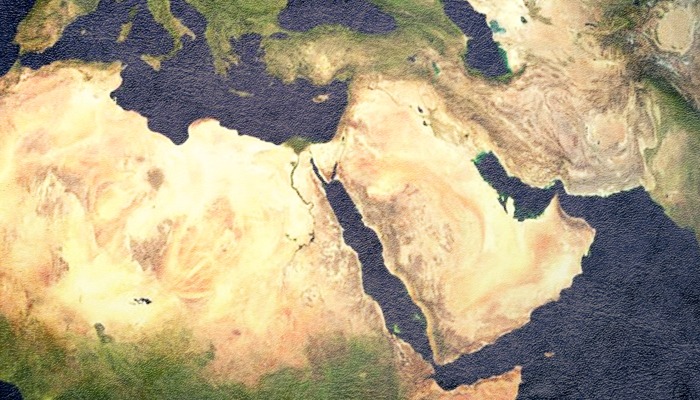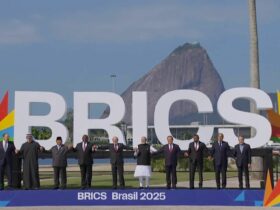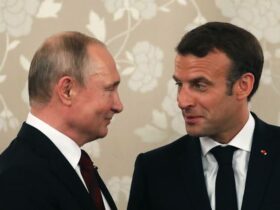Reporting from Cairo, Egypt
It can be said that the most important stop for US President Joe Biden’s tour to the Middle East is his visit to Saudi Arabia, during which he met Saudi King Salman bin Abdulaziz, his Crown Prince Mohammed bin Salman, and a number of Arab leaders.
The visit coincides with increasing pressures on the Democratic Party administration, especially in light of the rise in energy prices following the Russian invasion of Ukraine, the deadlock in nuclear negotiations with Iran, and the growing Russian-Chinese tide globally.
Biden’s visit to Israel and the occupied Palestinian territories was a traditional and largely symbolic visit, in light of the fact that the attempt to find a peaceful solution to the Palestine issue has been a central issue in Middle East politics for decades. The visit was not expected to produce anything tangible, serious and substantial for the benefit of the Palestinians.
One can say that his visit to the Hebrew state was only a preliminary visit to the Kingdom, especially since the agenda of his visit to Jeddah requires arrangements and coordination with the Israelis on some issues, before talking to Saudi and Arab leaders, especially regarding Iranian nuclear issues, launching a new peace process between Israel and the Palestinians, transferring the islands of Tiran and Sanafir from Egyptian sovereignty to Saudi Arabia, and regional security arrangements.
Inevitable convergence
Many experts see the convergence between the United States and Saudi Arabia as inevitable, given the kingdom’s influence in the region and its position as one of the world’s largest oil producers.
The visit comes within the US attempts to attract important Arab countries such as Saudi Arabia, Egypt and others in the face of the Russian-Chinese tide. This deems greater importance especially after the Ukrainian war has divided the world into two axes, one led by Russia and China and the other by America and the West.
Perhaps the rise in gasoline prices is the main factor that prompted Joe Biden to make his decision to visit Saudi Arabia in order to secure the production of more oil.
But Saudi officials are looking for answers in the American guest’s visit regarding American goals and intentions, and they have demands concerning a series of commitments across several areas that they hope to have satisfied after the US President leaves the kingdom.
Therefore, Biden’s tour was an attempt to recall the role of the United States in the region, which has recently declined. The visit to Saudi Arabia was an opportunity to begin rebuilding important bridges with the kingdom, and to return to a later role in the Middle East.
On the part of the Kingdom, Biden’s visit sends an important message to allies and adversaries alike that the United States is obliged to recognize the kingdom’s regional and global importance.
Saudi Arabia understands that the ultimate motivation for Biden’s visit is the need to secure an agreement on energy prices and ensure support for stalled initiatives. The Saudis see themselves as powerful because of their willingness to work with Russia and China on various economic and defense projects. And they have more options than they did before the Biden administration tried to isolate them.
Thus, they are using the visit to demand that their security concerns be addressed, and the need to include their voices in discussions regarding the future of the region and major threats such as Iran.
A return to the normal situation
According to a Saudi source, which declined to be named, the kingdom has never been enthusiastic about working with Russia or China, despite the investments of Saudi businessmen in those countries.
The source explained that China has influence in the Kingdom through many projects including security technology, the production of missiles and drones and in projects such as NEOM. But there is recognition within the royal family that China is not a long-term partner or ally of Saudi Arabia.
According to the source, China has its own regional agenda and is also very close to Iran, just like Russia.
“There is a preference for security cooperation with the United States, but given the mistrust of previous administrations and the volatility of American policy, Arab leaders in the entire region believe it is important to diversify relations to include other powers and not rely on the United States, which suffers from volatile policies that harm their countries”, the source said.
Saudi writer Faisal Abbas, editor-in-chief of the Saudi Arab News website, says that the importance of this visit for both parties is clear to everyone in the kingdom.
“Despite Biden’s previous threats to isolate the Kingdom, the visit confirms that no sane official wants to tear up a strategic relationship with a country of the size and importance of Saudi Arabia, the cradle of Islam, the home of the sacred institutions of 2 billion people and the most important oil-producing country in the world”, he said.
Abbas criticized the term “reorientation of relations with the kingdom” that Biden used in his article in the Washington Post to describe his goal of visiting Jeddah.
The Saudi writer explained that the visit of the American president is a return to the normal situation of cooperation, as was the case in ending the Soviet invasion of Afghanistan, fighting side by side to liberate Kuwait, and executed in the continuous cooperation to combat terrorism, in the field of space exploration and establishing businesses with the aim of providing hundreds of thousands of job opportunities for Saudis and Americans alike.
He pointed out that any deviation from the normal course of things falls on the side of the United States, not the Kingdom.
“For example, with regard to Yemen, the current administration’s initial policy was to withdraw, and to remove the Iranian-backed Houthis from the terrorism list, as well as to withdraw Patriot missile batteries from the kingdom. This happened at a time when Saudi civilians and oil infrastructure were under attack in a country that Biden describes as a strategic partner for 80 years”, he said.
“The oil installations were targeted at a time when global energy prices were recording their highest levels ever, and we all know that limiting supply leads to an inevitable result, which is more price hikes”, he added.
US concession
Dr. Rashad Abdo, the economic expert and head of the Egyptian Forum for Economic and Strategic Studies, considered that the visit of the American president to Saudi Arabia, and his meeting with leaders of some Arab countries confirm the pivotal role played by these countries, especially in light of the economic crises that the world is going through, and the conditions of the Russian-Ukrainian war.
“The countries included in the meeting are rich in oil and gas, the most prominent concern of the US President after the Russian invasion of Ukraine”, the economist added.
In my opinion, this is a fact. The Jeddah summit includes the leaders of Saudi Arabia, the United Arab Emirates, Egypt, Iraq, Qatar, Kuwait, Oman, Jordan and Bahrain. According to International Monetary Fund data, these countries together constitute 22% of global oil production and 13% of global natural gas production.
With the exception of this issue, it is not expected that we will witness major breakthroughs resulting from the summit talks in the coming period.
But the most important development that the visit witnessed was the transfer of sovereignty over the islands of Tiran and Sanafir from Egypt to Saudi Arabia, and the subsequent security arrangements in coordination with Israel in light of the two islands being linked to security annexes with Egypt within the peace treaty between the two countries in 1979, which Riyadh paid for by allowing Israeli civil aviation to cross the kingdom’s airspace without restrictions.
This step is the biggest historical breakthrough, because it is the starting point for Saudi-Israeli normalization, even if that takes a while.
The concession made by the US President to visit Jeddah and meet the Saudi crown prince despite his repeated threats to renounce the kingdom, against the backdrop of accusations that Mohammed bin Salman is responsible for the killing of journalist Jamal Khashoggi, confirms that Biden was making a hasty attempt to save America’s interests in the region, many of which are in the hands of Riyadh and its allies.

















Leave a Reply